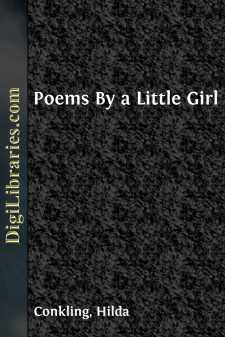Categories
- Antiques & Collectibles 13
- Architecture 36
- Art 48
- Bibles 22
- Biography & Autobiography 813
- Body, Mind & Spirit 142
- Business & Economics 28
- Children's Books 17
- Children's Fiction 14
- Computers 4
- Cooking 94
- Crafts & Hobbies 4
- Drama 346
- Education 46
- Family & Relationships 57
- Fiction 11829
- Games 19
- Gardening 17
- Health & Fitness 34
- History 1377
- House & Home 1
- Humor 147
- Juvenile Fiction 1873
- Juvenile Nonfiction 202
- Language Arts & Disciplines 88
- Law 16
- Literary Collections 686
- Literary Criticism 179
- Mathematics 13
- Medical 41
- Music 40
- Nature 179
- Non-Classifiable 1768
- Performing Arts 7
- Periodicals 1453
- Philosophy 64
- Photography 2
- Poetry 896
- Political Science 203
- Psychology 42
- Reference 154
- Religion 513
- Science 126
- Self-Help 84
- Social Science 81
- Sports & Recreation 34
- Study Aids 3
- Technology & Engineering 59
- Transportation 23
- Travel 463
- True Crime 29
Poems By a Little Girl
by: Hilda Conkling
Description:
Excerpt
FOR YOU, MOTHER
I have a dream for you, Mother,
Like a soft thick fringe to hide your eyes.
I have a surprise for you, Mother,
Shaped like a strange butterfly.
I have found a way of thinking
To make you happy;
I have made a song and a poem
All twisted into one.
If I sing, you listen;
If I think, you know.
I have a secret from everybody in the world full of people
But I cannot always remember how it goes;
It is a song
For you, Mother,
With a curl of cloud and a feather of blue
And a mist
Blowing along the sky.
If I sing it some day, under my voice,
Will it make you happy?
Thanks are due to the editors of Poetry: A Magazine of Verse, The Delineator, Good Housekeeping, The Lyric, St. Nicholas, and Contemporary Verse for their courteous permission to reprint many of the following poems.
A book which needs to be written is one dealing with the childhood of authors. It would be not only interesting, but instructive; not merely profitable in a general way, but practical in a particular. We might hope, in reading it, to gain some sort of knowledge as to what environments and conditions are most conducive to the growth of the creative faculty. We might even learn how not to strangle this rare faculty in its early years.
At this moment I am faced with a difficult task, for here is an author and her childhood in a most unusual position; these two conditions—that of being an author, and that of being a child—appear simultaneously, instead of in the due order to which we are accustomed. For I wish at the outset to state, and emphatically, that it is poetry, the stuff and essence of poetry, which this book contains. I know of no other instance in which such really beautiful poetry has been written by a child; but, confronted with so unwonted a state of things, two questions obtrude themselves: how far has the condition of childhood been impaired by, not only the possession, but the expression, of the gift of writing; how far has the condition of authorship (at least in its more mature state still to come) been hampered by this early leap into the light?
The first question concerns the little girl and can best be answered by herself some twenty years hence; the second concerns the world, and again the answer must wait. We can, however, do something—we can see what she is and what she has done. And if the one is interesting to the psychologist, the other is no less important to the poet.
Hilda Conkling is the younger daughter of Mrs. Grace Hazard Conkling, Assistant Professor of English at Smith College, Northampton, Massachusetts. At the time of writing, Hilda has just passed her ninth birthday. Her sister, Elsa, is two years her senior. The children and their mother live all the year round in Northampton, and glimpses of the woods and hills surrounding the little town crop up again and again in these poems. This is Emily Dickinson's country, and there is a reminiscent sameness in the fauna and flora of her poems in these.
The two little girls go to a school a few blocks from where they live....


